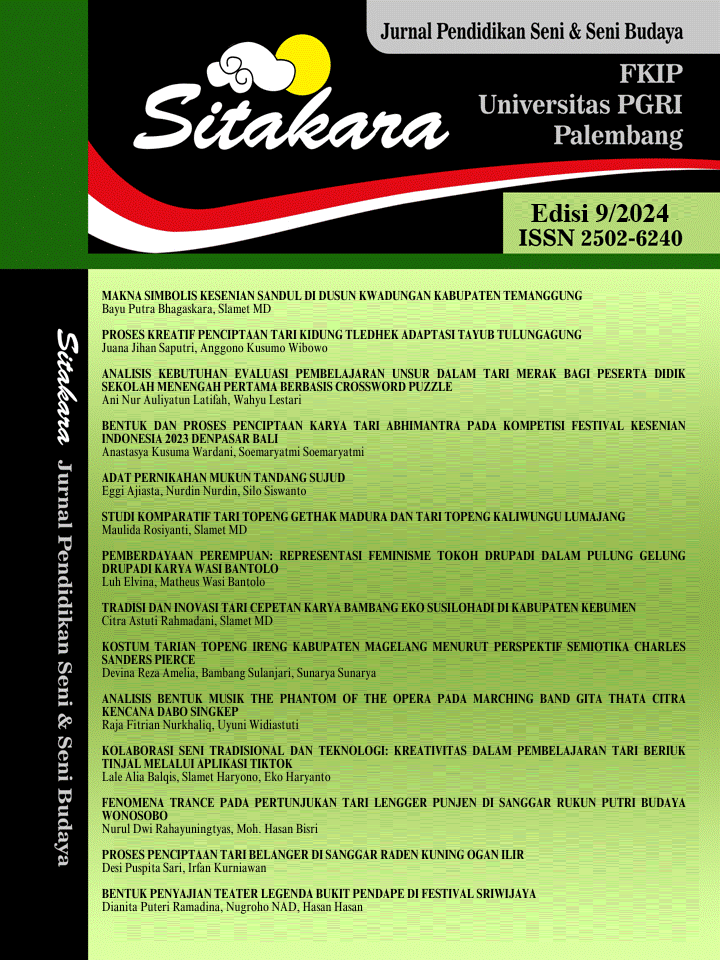Analisis Kebutuhan Evaluasi Pembelajaran Unsur Dalam Tari Merak Bagi Peserta Didik Sekolah Menengah Pertama Berbasis Crossword Puzzle
DOI:
https://doi.org/10.31851/sitakara.v9i2.13759Abstract
This research to create innovative learning in creative evaluation through a crossword puzzle. The problem is focused on the fact that teachers still use conventional or paper-based learning evaluation models. To approach this issue, Sugiyono's theory on Evaluation is used as a reference for conducting the research. The learning evaluation process was carried out at SMP IT INSAN CENDEKIA to analyze the needs of students and teachers in the learning evaluation process at the school. The research method used is Research and Development (R&D), which will produce an online-based learning evaluation innovation. Data was collected through qualitative research used to capture art learning evaluation assessment data conducted by teachers using observation, interviews, and documentation data collection techniques. The data was analyzed descriptively qualitatively. Quantitative research was used to test the validity and reliability of the products to be produced. The results of the research show that the wordwall puzzle is very practical for use by students of SMP IT INSAN CENDEKIA in the learning evaluation process, with 22 out of 24 students able to understand and use this application effectively. This study concludes that the online-based crossword puzzle learning evaluation model can provide new innovations in the evaluation process and has a high level of effectiveness and efficiency.
References
Asrul, Abdul Hasan Saragi, M. (2022). Evaluasi Pembelajaran (Cetakan Pe). Perdana Publishing.
Dwi Ermawati, Y., & Yonisa Kurniawan, R. (2019). Analisis Pengembangan Alat Evaluasi Pembelajaran Berbasis Intranet. Jurnal Pendidikan Ekonomi (JUPE), 7(2), 67–70. https://doi.org/10.26740/jupe.v7n2.p67-70
GTK, S. (2023). Kurikulum Merdeka Membuat Guru Semakin Kreatif dan Murid Siap Berkarya. Direktorak Jendral Guru Dan Tenaga Kependidikan. https://gtk.kemdikbud.go.id/read-news/kurikulum-merdeka-membuat-guru-semakin-kreatif-dan-murid-siap-berkarya
Iryanti, V. E., & Jazuli, M. (2001). Mempertimbangkan Konsep Pendidikan Seni (Considering the Concept of Art Education). Harmonia Journal of Arts Research and Education, 2(2), 40–48.
Kaliky, P. I. (2013). Pemanfaatan Internet Dalam Pembelajaran Mahasiswa di Universitas Pattimura, Ambon. Jurnal Komunikasi Kareba, 2(1), 110–120.
Kemendikbud. (2021). Ini Target Merdeka Belajar 15 Tahun ke Depan. 3 Juli. https://gurudikdas.kemdikbud.go.id/news/Ini-Target-Merdeka-Belajar-15-Tahun-ke-Depan
Mardiah, S. (2007). Model-Model Evaluasi Pendidikan. 02(01), 38–50.
Masykur, R., Nofrizal, N., & Syazali, M. (2017). Pengembangan Media Pembelajaran Matematika dengan Macromedia Flash. Al-Jabar : Jurnal Pendidikan Matematika, 8(2), 177. https://doi.org/10.24042/ajpm.v8i2.2014
Mukti, M. P. W., & Lestari, W. (2008). Pelaksanaan Evaluasi Pembelajaran Seni Budaya Di Smp 1 Jekulo Kudus Pada Masa Pandemi Covid-19. VI(1), 282.
Nasrulloh, I., & Ismail, A. (2018). Analisis Kebutuhan Pembelajaran Berbasis Ict. Jurnal Petik, 3(1), 28. https://doi.org/10.31980/jpetik.v3i1.355
Nurbaya. (2021). Peran Ibu Pegawai Negeri Sipil Pada School From Home Anak Di Masa Pandemi Covid-19 (Studi Kasus Di Kelurahan Penrang Kecamatan Watang Sawitto Kabupaten Pinrang). 19.
Setia Budi. (2023). Seni Tari. Smksetiabudibinjai.Sch.Id. https://smksetiabudibinjai.sch.id/
Arifin, Zainal. 2013. Evaluasi Pembelajaran. Bandung: Remaja Rosdakarya
Trianggono, Mochmmad Maulana. 2013. Pengembangan Perangkat Evaluasi Pembelajaran Fisika berbasis Web di SMA. Skripsi , FE Unesa
Latip, Asep Ediana. 2018. Evaluasi Pembelajaran di Tingkat Dasar. Bandung: PT. Remaja Rosdakarya.
Arikunto, Suharsimi. 2013. Dasar-dasar Evaluasi Pendidikan. Jakarta: BumiAksara.
Arifin, Z. (2009). Evaluasi Pembelajaran: Prinsip, Teknik, Prosedur. Bandung: Remaja Rosda Karya.
Majid, Abdul. 2008. Perencanaan Pembelaja ran. Bandung : Remaja Rosda Karya
Supriyono. 2013. Evaluasi Program Untuk Pendidikan Dan Pelatihan. Bandung: Fakultas Ilmu Pendidikan Universitas Negeri Malang
Widoyoko, E. P. 2010. Evaluasi Program Pembelajaran: Panduan Praktik Bagi Pendidik dan Calon Pendidik. Yogyakarta: Pustaka Pelajar
Raharjo, S. B. (2012). Evaluasi Trend Kualitas Pendidikan di Indonesia. Jurnal Penelitian Dan Evaluasi Pendidikan, 16(2), 298–319
Downloads
Published
How to Cite
Issue
Section
License
Copyright (c) 2024 Ani Nur Auliyatun Latifah, Wahyu Lestari

This work is licensed under a Creative Commons Attribution-ShareAlike 4.0 International License.
1. License
Use of articles will be governed by the Creative Commons Attribution - ShareAlike license as currently displayed on Creative Commons Attribution - ShareAlike 4.0 International License (CC BY-SA)
The author warrants that the article is original, written by stated author(s), has not been published before, contains no unlawful statements, does not infringe the rights of others, is subject to copyright that is vested exclusively in the author and free of any third party rights, and that any necessary written permissions to quote from other sources have been obtained by the author(s).
Jurnal Sitakara's spirit is to disseminate articles published are as free as possible. Under the Creative Commons license, Halaman Olahraga Nusantara permits users to copy, distribute, display, and perform the work. Users will also need to attribute authors and Jurnal Sitakara on distributing works in the journal and other media of publications.
4. Rights of Authors
Authors retain all their rights to the published works, such as (but not limited to) the following rights;
1. Copyright and other proprietary rights relating to the article, such as patent rights,
2. The right to use the substance of the article in own future works, including lectures and books,
3. The right to reproduce the article for own purposes,
4. The right to enter into separate, additional contractual arrangements for the non-exclusive distribution of the article's published version (e.g., post it to an institutional repository or publish it in a book), with an acknowledgment of its initial publication in this journal Sitakara.
5. Co-Authorship
If the article was jointly prepared by more than one author, any authors submitting the manuscript warrants that he/she has been authorized by all co-authors to be agreed on this copyright and license notice (agreement) on their behalf, and agrees to inform his/her co-authors of the terms of this policy. Jurnal Sitakara will not be held liable for anything that may arise due to the author(s) internal dispute. Jurnal Sitakara will only communicate with the corresponding author.
6. Royalties
Being an open accessed journal and disseminating articles for free under the Creative Commons license term mentioned, author(s) aware that Jurnal Sitakara entitles the author(s) to no royalties or other fees.
Sitakara Jurnal oleh http://univpgri-palembang.ac.id/e_jurnal/index.php/sitakara dilisensikan di bawah Lisensi Internasional Creative Commons Attribution-ShareAlike 4.0 .




.png)





















